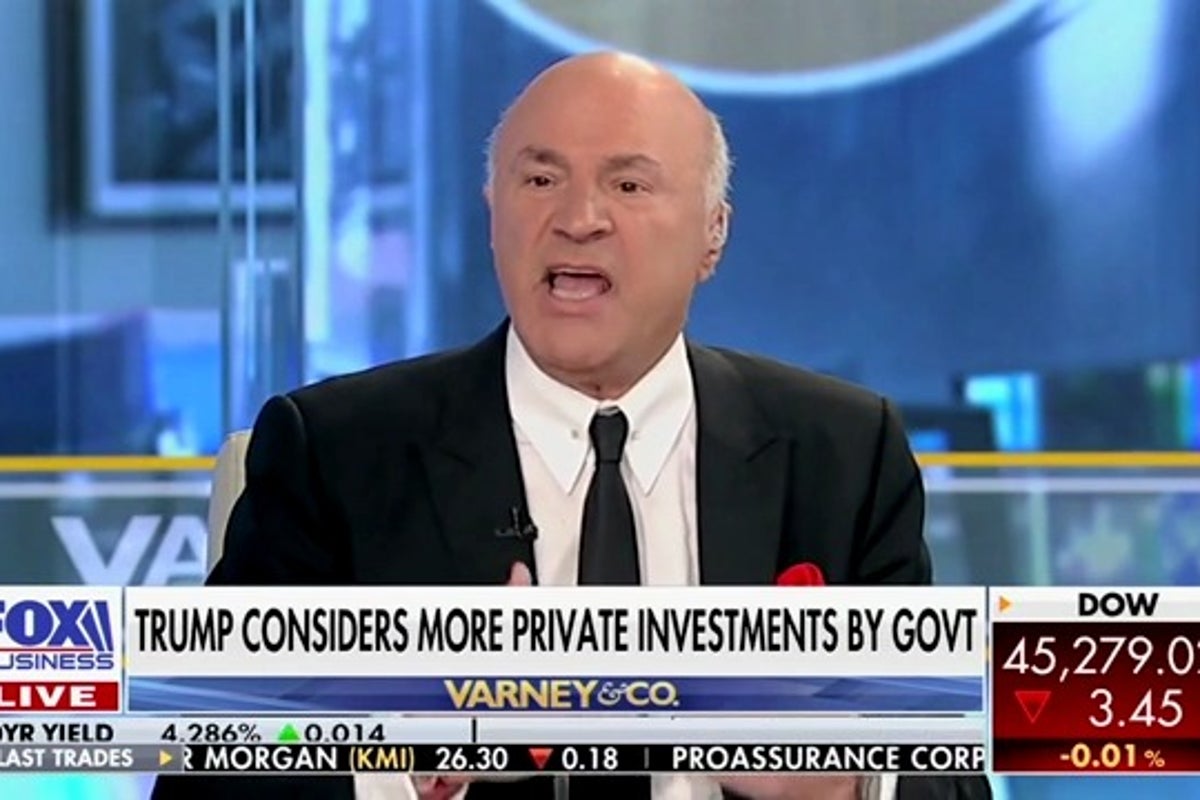
MAGA-boosting Shark Tank host Kevin O’Leary joined the growing chorus of conservative voices criticizing Donald Trump’s move to take a 10 percent government stake in American chip maker Intel, deriding it as a “really, really bad idea” on Tuesday morning.
O’Leary’s remarks come a day after the self-anointed “Mr. Wonderful” called the Intel decision “abhorrent” and said the government should “stay in its lane” rather than give tax dollars “to a company that has performed so miserably.”
Meanwhile, as many of the president’s allies have increasingly taken issue with the partial nationalization of the troubled tech firm, describing it as akin to communism and “corporate statism,” Trump administration officials are not only defending the move but suggesting it’s merely the tip of the iceberg.
“Oh there’s a monstrous discussion about defense,” Commerce Secretary Howard Lutnick told CNBC on Monday, suggesting that the Pentagon could soon own large chunks of defense contractors such as Lockheed because they are “basically an arm of the U.S. government” already.
“But what’s the economics of that? I’m going to leave that to my Secretary of Defense and the deputy Secretary of Defense,” Lutnick added. “These guys are on it and they’re thinking about it.”
In a separate CNBC interview, National Economic Council Director Kevin Hassett insisted that the Intel stake was “more like a down payment on a sovereign wealth fund” while indicating that it was part of a broader strategy on the White House’s part.
“The president has made it clear all the way back to the campaign that he thinks that in the end, it would be great if the U.S. could start to build up a sovereign wealth fund, and so I’m sure that at some point, there’ll be more transactions if not in this industry in other industries,” Hassett declared.
And days after announcing the administration had taken 10 percent of the beleaguered tech giant, Trump himself said he would be pursuing “many more’ deals with other major companies, stating that this new strategy was to “get as much as I can.”
During his Tuesday morning appearance on Fox Business Network’s Varney and Co., O’Leary – who has generally heaped praise on Trump’s economic policies – tore into the president’s plan to nationalize certain industries, expressing concern that it further eroded the division between the private and public sectors.
“We let good companies thrive and then when companies fail, they die like a slug at the bottom of the ocean and the protein gets reabsorbed by private equity into the winning management teams,” the businessman and reality TV star maintained, prompting anchor Stuart Varney to somewhat defend the administration’s position.
“They’re turning around and saying you can’t afford to lose the chip industry, you want to develop it in America to go after China,” the Fox Business host stated.
O’Leary, meanwhile, insisted that Intel “lost its way a decade ago” and it should have been sold off in “pieces to the other players that emerged as winners” before urging the administration to back away from the deal.
“Don’t mess with it. Intel is a dog. I would never put my own money into it, and I’m glad I didn’t, it is where money goes to die and I certainly don’t want to put my tax dollars into it, being force-fed a loser,” O’Leary raged.
“I keep saying the same thing. Let it die. It is a grandmother on life support. It wants to die. Other people want to purchase the pieces that are left,” the investor concluded. “Nobody wants the product. We put 10 percent of taxpayers’ money into this… nobody wants their products. What are you going to do? Force-feed the chips down a dog? Who is gonna eat them?! This is a really, really bad idea!”
With the president making it clear that he will seek to obtain equity stakes in other large companies, conservative economists have called this strategy “curious and problematic,” especially since it veers away from the traditional Republican position that the government shouldn’t intervene in the free market.
“I think what we’re seeing is less a strategic, thoughtful shift toward state capitalism and more an opportunistic display of corporate shakedowns,” Michael R. Strain, an economist with the right-leaning American Enterprise Institute, told the New York Times. “Either way, this does create significant risks for the companies that are entering into these deals, and for the long-term prosperity of the American people.”
The Wall Street Journal, meanwhile, has noted that the president’s Intel move “blurs party lines on economic intervention,” pointing out that many GOP lawmakers have slammed the decision while some on the left have applauded the president for taking a stake in the chip manufacturer.
“Taxpayers should not be providing billions of dollars in corporate welfare to large, profitable corporations like Intel without getting anything in return,” Sen. Bernie Sanders (I-VT) said last week, urging the White House to go even further with its strategy.
“Today it’s Intel, tomorrow it could be any industry,” Sen. Rand Paul (R-KY) groused about the move. “Socialism is literally government control of the means of production.”
